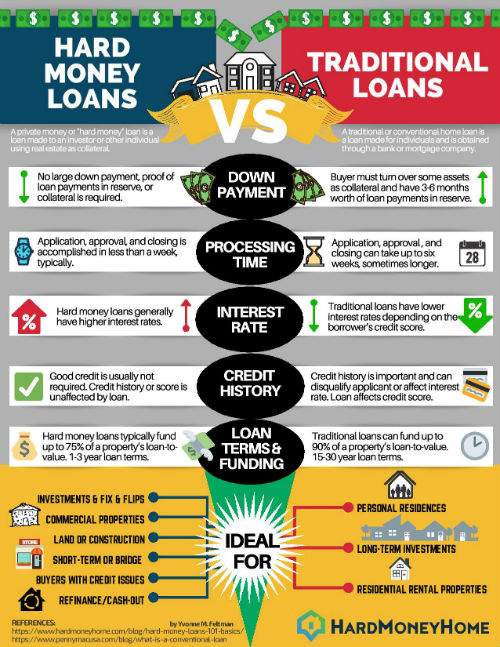The Function of Hard Money Loans in Real Estate Deals: What You Need to Know
Difficult money loans are a crucial funding tool in property deals. They use capitalists fast accessibility to resources, particularly in immediate situations. Secured by actual residential or commercial property, these lendings concentrate on possession value instead of the consumer's credit report. They come with significant dangers and prices. Comprehending the nuances of tough cash car loans is important for anybody seeking to browse this complicated financial landscape properly. What variables should capitalists take into consideration prior to continuing?
What Are Difficult Cash Finances?
Hard money finances serve as a crucial financing option in property deals, particularly for capitalists looking for fast access to capital. Unlike typical fundings, tough cash lendings are protected by real residential or commercial property and are largely based upon the worth of the property instead of the customer's creditworthiness. These financings are generally supplied by private lenders or financiers, enabling debtors to bypass lengthy approval procedures connected with conventional financing.
Tough money financings are usually short-term options, with repayment periods varying from a few months to a couple of years. Because of their expedited nature, they are popular among real estate fins and those needing instant funds for residential property procurement or rehabilitation. Rate of interest for hard cash car loans tend to be more than traditional finances, reflecting the enhanced risk lending institutions take on. In general, difficult cash lendings meet an essential role in the genuine estate market, dealing with those who need adaptability and rate in their funding options.
Advantages of Hard Money Loans
While conventional financing can be difficult and slow-moving, tough cash financings offer a number of unique advantages that attract real estate investors. One crucial benefit is the rate of the funding process; loans can commonly be approved and funded within days, enabling capitalists to seize chances quickly. This quick turn-around is specifically beneficial in competitive markets where time is of the essence.
Furthermore, hard cash loans are mainly asset-based as opposed to credit-based, implying that investors with less-than-perfect debt can still safeguard financing. This availability allows a wider variety of capitalists to engage in realty purchases.
Hard cash lending institutions normally have more flexible terms and conditions contrasted to standard lenders, permitting for customized settlement plans customized to specific job needs. This flexibility can improve a financier's ability to manage capital successfully throughout restoration or resale stages. Overall, these benefits make hard money lendings an engaging option for several property ventures.
Prospective Drawbacks to Consider
While hard money lendings can provide fast funding, potential disadvantages warrant mindful factor to consider. Consumers frequently deal with greater rate of interest prices contrasted to typical financing, which can boost total prices. In addition, the much shorter settlement terms may press debtors to safeguard refinancing or market the residential property earlier than prepared for.
Greater Passion Prices
Greater passion prices stand for a substantial consideration in difficult cash finances, particularly in realty transactions. These car loans commonly include rates that are substantially more than traditional funding choices, frequently varying from 8% to 15%. This elevated price can impact the total productivity of a property financial investment, as consumers might discover themselves assigning a larger part of their spending plan to rate of interest settlements. Additionally, the high rates can develop challenges for financiers seeking to take advantage of their funding properly. For those that are not planned for these financial ramifications, the burden of high-interest settlements can bring about capital issues, eventually influencing the success of the property investment. As a result, understanding the ramifications of higher rate of interest prices is necessary for possible debtors.
Shorter Settlement Terms
Shorter payment terms are a specifying characteristic of difficult cash fundings, which can present various difficulties for consumers. Normally ranging from six months to 3 years, these terms call for borrowers to pay back the financing rapidly, often leading to monetary strain. The pressure to produce returns within a limited duration can push debtors to hurry home improvements or sales, potentially endangering the quality of the investment. In addition, the need of a speedy exit strategy might restrict alternatives for refinancing or marketing, leading to greater dangers. Borrowers should very carefully consider their economic abilities and market problems to prevent failing on these car loans, which can bring about the loss of the collateralized property.
Exactly How Hard Cash Car Loans Function
Hard money loans run with an unique framework that focuses on asset worth over credit reliability. The approval procedure is typically speedy, permitting borrowers to accessibility funds swiftly compared to conventional funding. In addition, an examination of rate of interest reveals that hard cash finances typically bring higher expenses, mirroring the increased danger taken by lending institutions.
Loan Framework Described

In click here actual estate deals, recognizing the structure of hard cash lendings is crucial for investors looking for fast financing. Hard cash financings are typically secured by genuine estate, with the residential or commercial property serving as security. These fundings typically involve greater rate of interest rates contrasted to traditional financing, showing the raised threat taken by lenders. The financing terms are normally short, often varying from six months to 3 years, helping with quick accessibility to capital. Loan quantities can vary substantially, typically depending upon the home's value as opposed to the debtor's credit reliability. Financiers gain from the expedited authorization procedure, allowing them to seize financial investment chances promptly. In general, the framework of difficult cash finances deals with those requiring fast, versatile financing options in realty markets.
Approval Refine Review
The authorization procedure for difficult money fundings is unique from conventional loaning approaches, primarily concentrating on the collateral as opposed to the consumer's credit history profile. Lenders review the worth of the home being made use of as collateral, ensuring it meets their requirements for threat evaluation. When a property is identified, consumers submit a funding application that includes information concerning the property and the intended usage of funds (Georgia hard money lenders). The lending institution performs a fast assessment and may need extra documentation, but the process is commonly accelerated contrasted to traditional financings. Authorization frequently occurs within days, allowing borrowers to access funds rapidly. This structured technique is beneficial for actual estate financiers looking for quick financing solutions for procurement or renovation jobs
Rate Of Interest Contrast
While difficult money lendings supply quick access to funds, their rates of interest are usually greater than those of typical home loans. Debtors can expect rates ranging from 8% to 15%, depending upon the lending institution and the specifics of the transaction. On the other hand, traditional mortgage prices usually drop in between 3% and 6%. The greater rates related to difficult cash loans mirror the enhanced threat lenders take, as these fundings are typically secured by the residential property itself as opposed to the consumer's creditworthiness. This implies that while hard money lendings can assist in quick funding for real estate financial investments, they can also result in considerably higher costs with time, making it important for debtors to thoroughly evaluate their economic circumstance before continuing.
When to Make Use Of Tough Money Fundings
When is it prudent to ponder difficult cash lendings in actual estate deals? Capitalists often think about these lendings in situations where conventional funding is either unavailable or not practical. For instance, hard cash financings can be helpful for homes requiring fast purchase, such as foreclosure public auctions or troubled residential or commercial properties needing prompt renovations.
Additionally, real estate investors seeking to capitalize on time-sensitive opportunities, like flipping houses, might discover tough cash fundings advantageous as a result of their expedited approval process. Additionally, debtors with less-than-perfect credit history or non-traditional residential properties may also select difficult cash financing, as lenders primarily concentrate on the residential or commercial property's worth as opposed to the customer's financial history.

Tips for Selecting a Tough Cash Lender
Exactly how can investors guarantee they pick the ideal difficult money lender for their realty requirements? Detailed study is vital. Financiers need to evaluate potential lenders by evaluating their online reputation, experience, and client testimonies. It is advisable to seek loan providers who focus on the kind of home being financed, as this can improve the chance of beneficial terms.
Next off, recognizing the lender's problems and terms is substantial. Financiers need to make inquiries regarding passion prices, costs, and repayment timetables. Clear communication is vital; lending institutions should agree to clarify any unpredictabilities.
Additionally, reviewing the lender's financing rate and adaptability can be valuable, specifically in competitive markets. Financiers need to likewise take into consideration developing a rapport with the lender, as an excellent partnership can assist in smoother deals. Lastly, consulting market professionals or genuine estate agents can supply more insights and referrals, making certain a well-informed decision.
Regularly Asked Questions
Can Hard Cash Loans Be Utilized for Industrial Properties?
Hard cash lendings can indeed be used for industrial buildings, offering quick financing options for investors - Georgia hard money lenders. These loans are typically protected by the residential property itself, permitting debtors to access funds without conventional loaning demands
What Is the Normal Loan-To-Value Proportion for Hard Money Loans?
The regular loan-to-value ratio for hard money loans usually varies from 60% to 75%. This proportion differs based upon the property type, lender policies, and private consumer circumstances, showing the greater danger connected with these finances.
Are Difficult Money Finances Offered to New Buyers?
Tough cash financings can be obtainable to newbie buyers, though terms vary by loan provider. These lendings typically have greater rate of interest and shorter settlement periods, making them a much less traditional selection for new buyers.
Just How Quickly Can I Close on a Difficult Cash Lending?
The speed of closing on a tough cash finance can vary, yet usually it varies from a few days to a couple of weeks, depending upon the lending institution's needs and the customer's monetary scenario. (Georgia hard money lenders)
What Files Are Required to Request a Hard Money Loan?

Unlike typical car loans, difficult cash loans are secured by real property and are largely based on the worth of the asset instead than the consumer's credit reliability. Rate of interest prices for difficult money car loans tend to be greater than typical financings, showing the raised danger loan providers undertake. The authorization process for hard cash loans is distinctive from standard loaning techniques, mainly focusing on the collateral rather than the customer's credit history account. The higher prices connected with difficult cash fundings reflect the raised risk loan providers take, as these fundings are typically secured by the home itself rather than the customer's creditworthiness. To apply for a difficult money loan, customers normally need to provide residential or commercial property information, a loan application, evidence of earnings, credit background, and identification.